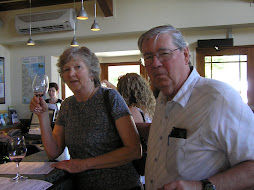


On Saturday, our first full day at Big Bend National Park, all 800 thousand plus acres of it, we did the logical thing – left the park to visit a quilt shop in the town of Terlingua! There Clara met Marguerite, and heard the tale that is the topic of this "Special Edition." [Parenthetically, the jist of this tale has been confirmed in separate conversations with two different volunteer Rangers here at the Park.]
For many years (Big Bend was opened in 1944) one of the charms of BBNP was the opportunity to be rowed across the Rio Grande for lunch in a Mexican home in the river-side community of Boquillas, or perhaps the further up-stream community of Santa Elena. In addition to this informal "transit-and-lunch" feature – which incidentally was mentioned in our "Welcome to Big Bend National Park" film presentation at the Visitor Center day before yesterday – many Mexicans came across to work (and shop) in the villages of Terlingua and Study Butte, TX. This was regarded as a normal way of life – after all, the Rio Grande is comparatively small and slow along here – where villages (and villagers) on opposite sides of a river work and live together.
No more! Since 9/11 the Mexicans have been told they'll be arrested (and some have been) if they row across the river as they have done for the past, nearly 60, years. To come across they must travel either to Del Rio, TX (more than 200 miles east) or Presidio, TX (more than 200 miles west) where there are official border crossings.
However, these villages are essentially cut off within their own country – roads from the villages to either of these border crossings (or to anywhere else in Mexico for that matter) are either very primitive or completely non-existent.
The result – according to Marguerite, villagers in Terlingua, and Rangers in BBNP, have observed former employees and acquaintances across the river nearly destitute and hungry. Little local efforts to provide relief have been mounted, but they're small and regulations make them quite complicated, requiring more than two hundred miles of travel to deliver something to someone less than a hundred feet away!
Where Marguerite fits into this picture is, of course, quilts. Women in the village of Boquillas have been making quilts, and for the past two years, a woman named Katie Tetreault, from Alpine, TX, has put together a show and sale, in Alpine, "The Ladies of Boquillas, Mexico present their Annual Boquillas Quilt Show and Sale." Unfortunately, none of the "Ladies of Boquillas" can attend since they would have to travel either to Del Rio or to Presidio to get a Visa to come across . . .
How did the "Ladies of Boquillas" get their start? Someone donated a treadle machine and some patterns – which the "Ladies" cannot read, so they look at the pictures and pattern pieces and improvise, and the result is more "folk art" than professional stitchery. Someone else donated an electric machine which was of no use since there was no electricity – until someone else put together a system with solar panels and brought that down.
Another woman, Cynta de Narvaez, makes the journey to Boquillas, taking fabric and sales proceeds over and bringing quilts back. Cynta, the child of Cuban parents in New York City, came to this area many years ago to work as a guide for excursions across the river to areas of interest in Mexico. (But, no more, as such excursions are not possible under post 9/11 regulations.) Marguerite, for her part, sells their quilts at her shop, with 100% of the proceeds going to the "Ladies of Boquillas."
Marguerite asks, "Is this really necessary in order to "secure our borders"? Are we not being a bit too rigid in the effort? Could we not devise some local system that would allow the continuation of the traditions of the past while still protecting our borders?" [The cynic in me says that GWB governs ONLY because he has played the "fear card" to the hilt!]
Would you like to have a part in helping these "Ladies of Boquillas" who are trying to help themselves? Fabric of all types will be put to good use, cash is always welcome when you have none. You can contact Cynta de Narvaez at (432) 371-2226 (or at P.O. Box 166, Terlingua, TX) or Katie Tetreault at (432) 837-3587 or Marguerite Chanslor at (432) 371-2292 (or at P.O. Box 142, Terlingua, TX 79852.) Additionally, Cynta is co-founder of an organization called Fronteras Unlimited which has a web-site at www.fronterasunlimited.org with her e-mail at cynta@fronterasunlimited.org
Here's a couple pictures of Marguerite with Clara and a picture of a child's quilt done by Silvia Gonzales, described as one of Boquillas better quilters.

No comments:
Post a Comment